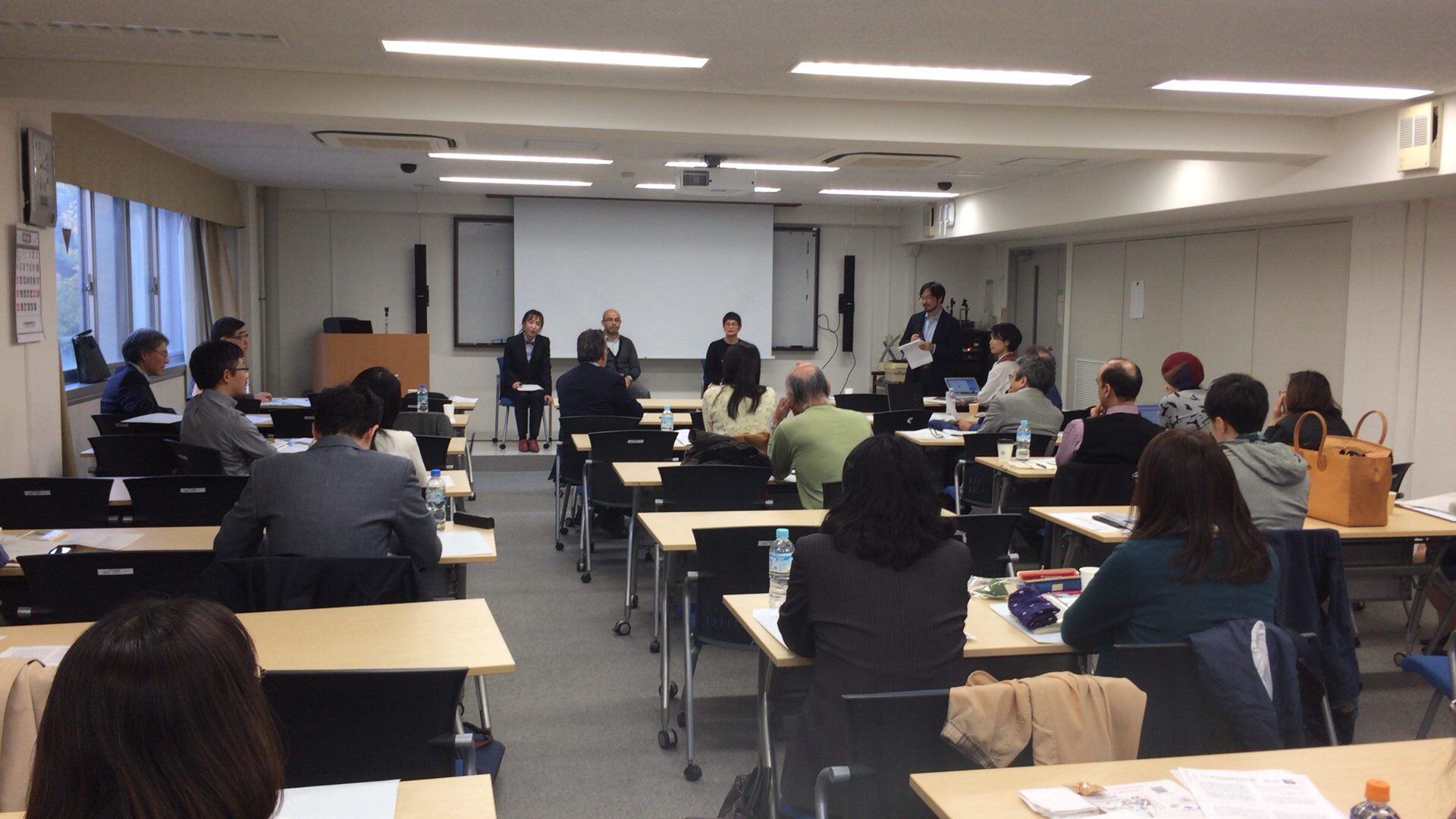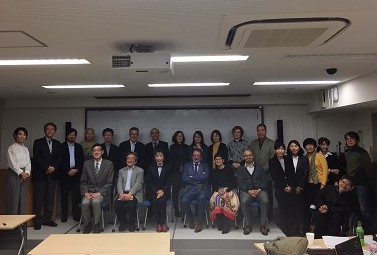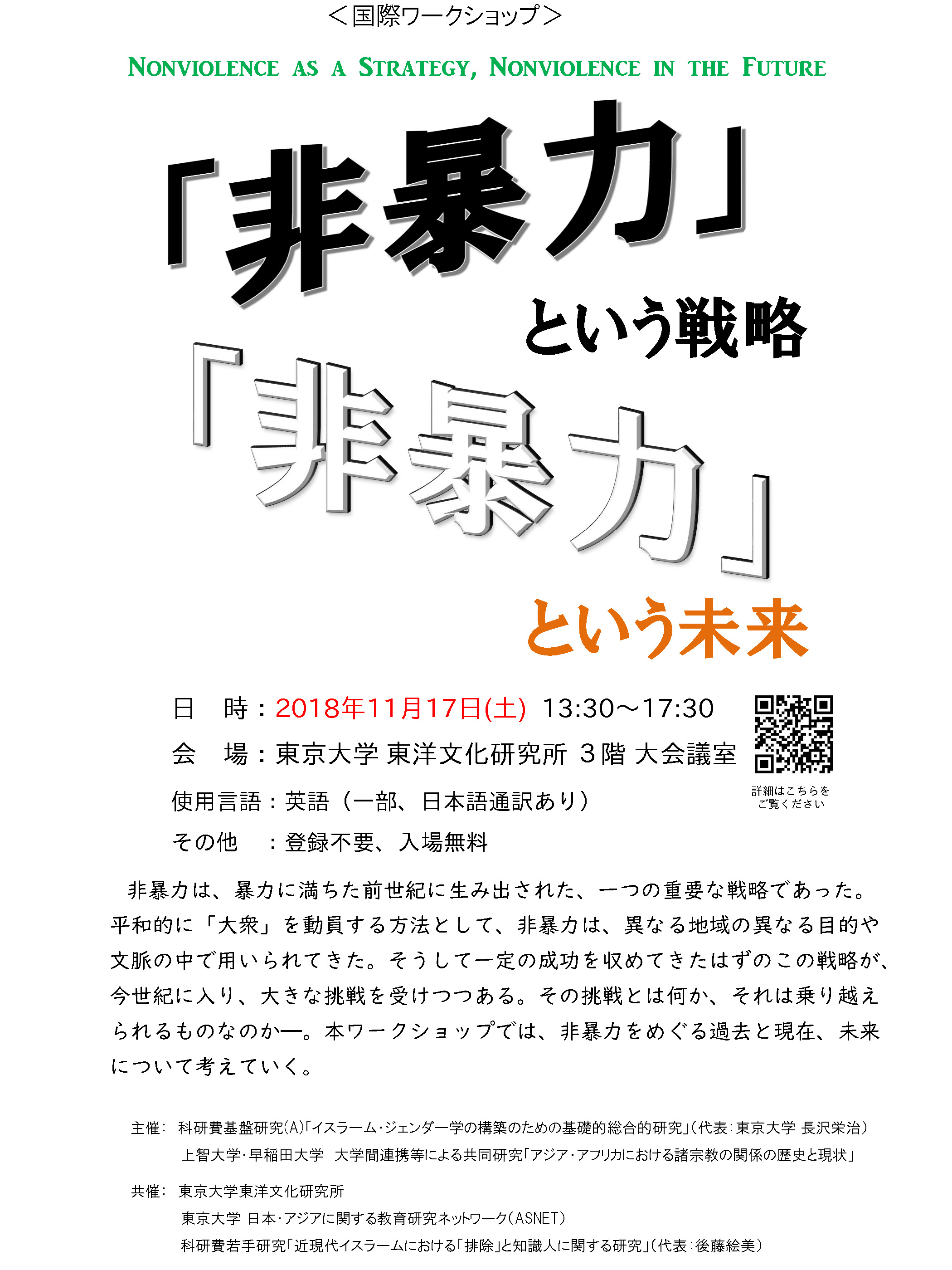2018年11月17日に国際ワークショップ「「非暴力」という戦略、「非暴力」という未来/International Workshop “Nonviolence as a Strategy, Nonviolence in the Future”」が開催されました。
登壇者のムハンマド・ムーサー氏による報告がMuslim Instituteのウェブサイトに掲載されました。
登壇者のシブリー・マッラート氏による報告がDaily Starの記事として掲載されました。
【全体報告】
The workshop “Nonviolence as a Strategy, Nonviolence in the Future” was co-organized by two projects: the Islam and Gender Studies project at the University of Tokyo and the Interreligious Relations in Asia and Africa project at Sophia University.
The seed of the idea for a nonviolence workshop was planted in November 2017, when several members of the Islam and Gender Studies project attended Professor Chibli Mallat’s lecture on law and gender and saw the connection between the philosophy of nonviolence and Islam and gender studies. Islam and gender studies is a new field of study that considers various topics from the two intertwined perspectives of Islam and gender. Our project leader, Professor Eiji Nagasawa, suggested that inserting a new term between “Islam” and “gender” would open up a wider scope of academic inquiry and encourage greater consideration of all three terms.
For this workshop, we added “nonviolence” into our project: Islam–nonviolence–gender. Collaborating with the Interreligious Relations in Asia and Africa project widened our scope even further, and we began to think about nonviolence not only from the perspectives of Islam and gender but also from that of interreligious relationships in Asia and beyond.
Professor Kei Nemoto introduced us to Aung San Suu Kyi’s (1945- ) philosophy of nonviolence, “A chain of violence may be ended by nonviolent action.” The Islam and Gender project has the same overall aim: to use nonviolence to end a chain of violence against groups called “minority.” To achieve that purpose, we organize symposiums, workshops, and seminars. This nonviolence workshop was one such link in a chain of nonviolent actions. It offered an opportunity to learn about the philosophies of nonviolence, its development, and the challenges it faces.
The workshop opened with remarks by Professor Hidemitsu Kuroki, a historian who has been studying modern Syria and Lebanon. He raised a question “why did the Syrian revolution end up in a violent internal conflict?” He said he believed the concept of “nonviolence” offered a clue, and he expected to learn from this workshop and refresh his thoughts.
The workshop was divided into two parts. Part one was on nonviolence as a strategy.
The first speaker, Maki Taniguchi, introduced the insights of Gene Sharp (1928-2018), one of the most famous advocates of nonviolence. Sharp, Taniguchi argued, had outlined a set of strategic tools for grassroots resistance to dictatorship and oppression, which he called “people power.”
The strength of people power over the state was one of the main tenets of the philosophy of Jawdat Said (1931- ), a Syrian-born Islamic thinker. The second speaker, Mohammed Moussa, described Said’s theological commitment to a principled refusal to obey the state. According to Said, the hierarchy of oppression among Muslims ought to be overturned in a rejection of the perpetuation of the rotation of social groups through which the oppressed becomes the oppressor and vice-versa.
Junko Toriyama, the last speaker of the first session critically discussed Mallat (2015 and 2017)’s special focus on women, a part of “people power,” as agents of non-violence movement. By examining the situation following “January 25 Revolution” in Egypt, Toriyama argued that in fact, women had become the target of a counter-revolution, which in turn gives special importance and credibility to women to speak up.
The second part of the workshop focused on the future of nonviolence.
Professor Nemoto showed us the contradictions of the double faces that nonviolence has worn in Burma. He explained that while Aung San Suu Kyi’s nonviolent philosophy had grown out of her conviction that “right ends will be achieved only when right means are applied,” the same was not true for the activists at the Thai-Burma border who had been using armed forces for more than 20 years For them, the adoption of nonviolent actions was a strategic measure to gain support from the international community. This example in Professor Nemoto’s lecture showed us a ray of hope for changing violence into nonviolence.
The final speaker, Professor Chibli Mallat, author of the book Philosophy of Nonviolence: Revolution, Constitutionalism, and Justice beyond the Middle East, responded to the previous speakers by sharing his analyses of the philosophy of nonviolence. He argued that a civil movement may be called a revolution only while it is nonviolent; once it gets violent, it becomes a civil war, the winner decided by which side has more arms and greater networks. He emphasized the need to consider the aftermath of nonviolent revolution. The goal of the revolution may be democracy and the creation of democratic states, but this is something of a dilemma as these states are composed of important violent elements.
In the closing remark, Professor Eiji Nagasawa pointed out that violence tends to disproportionately affect the weaker members of society, and a nonviolent action may be recognized as more successful if these members of society take the lead; this may explain the importance of women and ethnic minorities in many nonviolent movements.
* * *
I learned a great deal during the workshop and have thought a lot since, but what struck me the most was the point made by Professor Mallat: we need to think about what follows nonviolent revolution. The same is true for any smaller nonviolent action, including my Hanan Chocolate project. We cannot just abandon the current system (e.g. the halal certification system) and go with none. We need to build new systems for which nonviolence is part of the structural design. Here, we may borrow the concept of “people power” developed by Gene Sharp or Jawdat Said. Our challenges and efforts will continue, as academics and/or activists.
(Written by Emi Goto, Associate Professor, The University of Tokyo, one of the organizers)
当日は30名ほどが集まり、議論も大いに盛り上がりました。今回も参加した大学院生の皆さんに報告文を寄せていただきました。
【報告文1】
現代に生きる私たちは、「戦争のない世界」をそのまま「平和な世界」とは考えられなくなっている。そうした状況はヨハン・ガルトゥングの唱える「構造的暴力」という言に顕著に表れている。これは直接的に人に危害を加えるという意味での暴力ではないが、望まない不利益をこうむる人々は存在するのだから、そうしたなかで生じていることもまた別のかたちの暴力として認識すべきという視点を与えるものである。今回のワークショップにおいて、非暴力を一つの重要な戦略として捉え、また、非暴力をめぐる過去と現在、未来について考えたことは、様々なかたちの暴力が存在する世界のなかに生きている私たちにとって大きな重要性を持つものであり、同時に示唆を与えるものであった。
ワークショップ第一部のテーマでもあったnonviolence as a strategyは、非暴力を単に暴力を伴わないものと一義的に捉える視点を超え、それが究極的には人々の平和にかかわる問題であり、したがって社会正義にかかわる問題でもあるという視点を与えるものであった。そうしたことは、第一部と第二部の連続した議論のなかで見出された。具体的には、第一部において、非暴力運動におけるその方法論と、非暴力に関する理論的展開、またその実践主体についての具体的な議論に触れ、また、続く第二部nonviolence in the futureにおいて、非暴力を歴史的な展開のなかに位置付けると同時に、より広い文脈、すなわち人権との関わりにおいて捉える必要性を認識した。またそれは、非暴力に関する議論が、個々の事例に引きつけてその特殊性を論じるような議論を超えて、人々の権利の問題というより大きな問題と切り離しがたいものとして存在することに目を向ける、一つの重要な契機となった。
非暴力というものが人々の意識において浮上するとき、それは一つの理想として、あるいは悲惨な現状を前にその実践が困難なものとして、人々のなかに立ち現れるようにも思われる。だがそれは、あまりにも頻繁に人々の平和が侵される昨今の世界に生きているからこそ、人々が生きていくうえでの強力な戦略として、また、決して実現不可能ではない実践として、追求されるべきものなのである。引いては、それは人間の日常性の確保の問題であり、同時に、どのような世界で生きたいか、そしてその中でどうありたいかという、人々の具体的な希望を描き出すことにもつながるのではないだろうか。
(報告執筆:東京大学大学院 学際情報学府 修士課程 濱中麻梨菜)
【報告文2】
今回の国際ワークショップは、研究対象や国籍の異なる多様な登壇者による発表、議論を通じて、非暴力の未来について考えていくというものである。ワークショップは、「戦略」と「未来」という二つのパートで構成され、各発表はもちろんのこと、間のQ&Aセッションでも白熱した議論が行われた。
まず、第一パートにおける「非暴力という戦略」においては、ジーン・シャープの戦略的非暴力行動論や、国家への不服従に関する神学的議論を行ったジャウダト・サイードの紹介、また、エジプト「1月25日革命」の事例についての紹介があった。続くQ&Aセッションでは、イスラームと非暴力運動について、ジェンダーなどにも言及しながら参加者と登壇者との間で活発な議論が行われた。
つづく、第二パートにおける「非暴力という未来」においては、現在世界の注目を集めるアウンサンスー・チーのミャンマー民主化に向けた非暴力戦略、また、最後に登壇者の発表に対応する形で著書『非暴力の哲学』を基礎とした発表が行われた。第二パートで特に印象的だったのは、『非暴力の哲学』の著者であるマッラート氏が”Each one of our own traditions has history of non-violence.”と指摘していた点である。非暴力はどの社会にも伝統にも存在してきた人間の営みなのである。
戦略としての非暴力、そして非暴力はどこへ向かっていくのか、というワークショップのテーマは、シリア内戦について関心を持っている私にとって意義深いものであった。シリアに限らず各地で「暴力」が蔓延する現代において、「非暴力」が持つ意味は、より一層その重要性を増しているように感じる。
(報告執筆:東京大学大学院 総合文化研究科 地域文化研究 修士課程 輿石幸之介)
——————————
開催情報
|
日時 |
2018年11月17日(土)13:30-17:30 |
|---|---|
| 場所 | 東京大学東洋文化研究所3階大会議室 |
|
使用言語 |
英語(一部、日本語通訳あり) |
|
プログラム |
司会:高橋圭(日本学術振興会/上智大学)
13:30開会の言葉 黒木英充(東京外国語大学・アジア・アフリカ言語文化研究所)
13:40 趣旨説明 後藤絵美(東京大学)
13:50 第一部:「非暴力」という戦略
谷口真紀(滋賀県立大学) 「戦略的非暴力行動の主唱者、ジーン・シャープ」
ムハンマド・ムーサー(イスタンブル・サバハッティン・ザイム大学) 「ジャウダト・サイードと非暴力の終焉:不服従、国家、民の力」
鳥山純子(立命館大学) 「女性性か反マッチョ主義か―非暴力運動における女性の役割を再考する」
14:50 質疑応答
15:20 コーヒーブレイク
15:40 第二部:「非暴力」という未来
根本敬(上智大学) 「アウンサンスーチーの「非暴力」戦略―ビルマ(ミャンマー)の民主化に向けて」
シブリー・マッラート(ユタ大学、マッラート法律事務所) 「女性、宗教、法と「非暴力」の未来―『非暴力の哲学』への議論
16:40 質疑応答と議論
17:20 閉会の言葉 長沢栄治(東京大学)
|
|
主催 |
科研費基盤研究(A)「イスラーム・ジェンダー学の構築のための基礎的総合的研究」(代表:東京大学 長沢栄治)
上智大学・早稲田大学 大学間連携等による共同研究「アジア・アフリカにおける諸宗教の関係の歴史と現状」 |
|
共催 |
東京大学東洋文化研究所
東京大学 日本・アジアに関する教育研究ネットワーク(ASNET) 科研費若手研究「近現代イスラームにおける「排除」と知識人に関する研究」(代表:後藤絵美) |
|
その他 |
登録不要、入場無料 |




